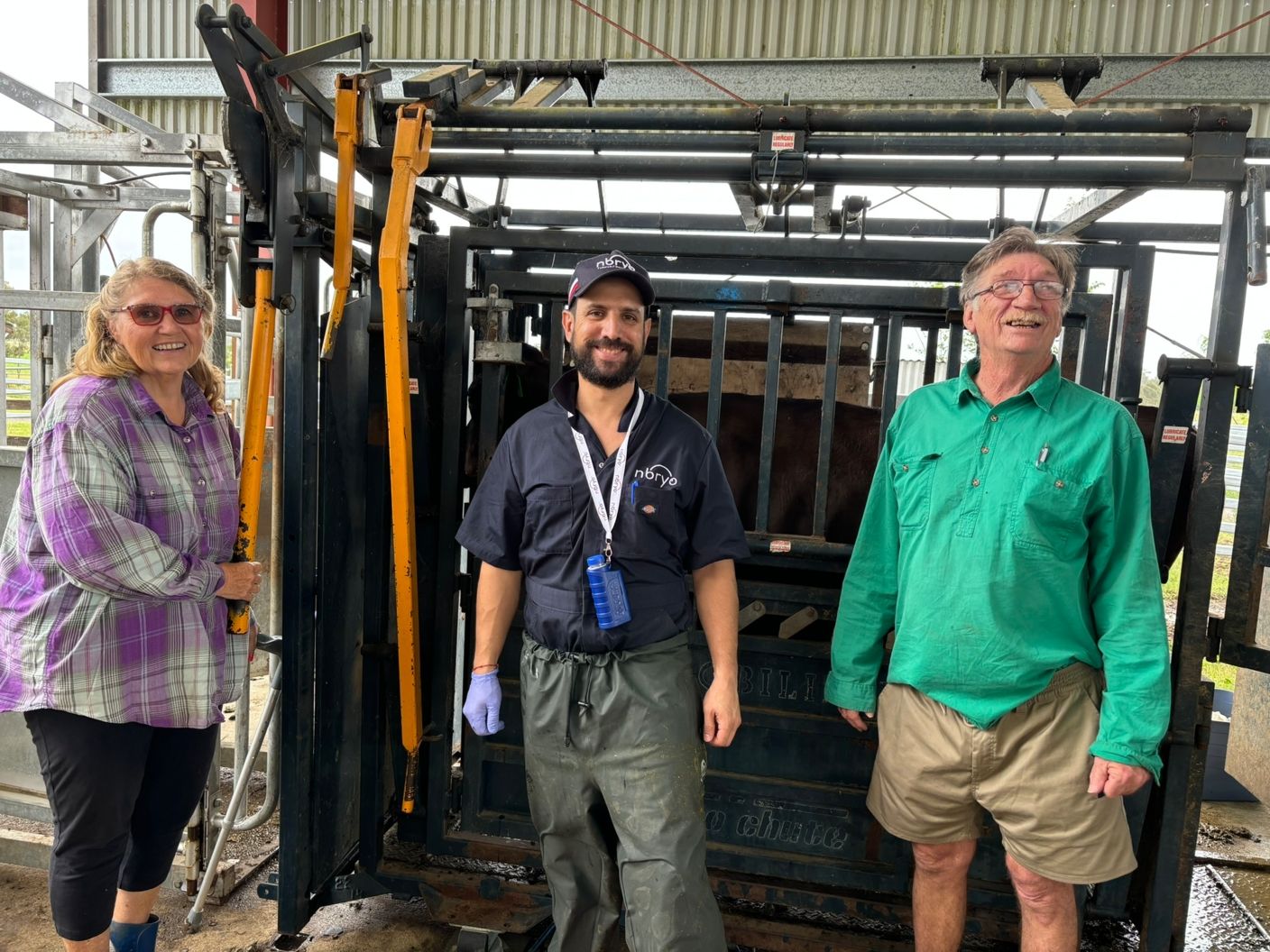
A desire to be at the forefront of leading artificial breeding technologies with their cattle herd has led a Queensland Wagyu operation to be announced as an Nbryo Tech Ambassador.
The family consider themselves as early adopters of agtech and were quick to partner with the Tech Ambassador program offered by Nbryo, a company using bio-digital and robotic technologies to produce elite high-quality embryos at scale.
Working with herds over a long-term partnership, the Nbryo Tech Ambassador Program gives participants early and priority access to the latest technology platform, the opportunity to accelerate genetic improvement within their herds at low cost and benchmark their breeding herd.
Jemalong Pastoral has 460 Wagyu fullblood stud and F1 and F2 commercial breeders running on irrigated improved pastures in a 900mm rainfall zone.
In 2008, Jemalong started breeding F1 Wagyu and transitioned to a joint venture in 2017 with the late Dr Simon Coates, a pioneer of the Australian Wagyu industry.
Under his guidance and the use of Sumo Cattle Company genetics, the operation was expanded to also breed fullblood black Wagyu using donor embryos implanted into recipient females.
Today, Jemalong’s commercial enterprise finishes fullblood and crossbred steers and cull heifers to feedlot entry weights of 350-450kg for 350–400-day grain fed programs.
The family wanted to breed their own quality fullblood bulls using cost effective artificial breeding technology and superior semen to boost their productivity and profitability.
They investigated IVF, completing several programs, and visiting Nybro’s sister company, Nindooinbah, for field days and shared learning.
When the Bachmanns heard about the Nbryo Tech Ambassador Program, they were quick to embrace it off the back of their Nindooinbah experience.
They aim to breed elite replacement heifers, steers with superior carcase traits, increase their herd size to 500 fullbloods and build the Wagyu content of their commercial herd to around 250 F3 and purebreds.
“Our breeding program is not just about volume, or rapidly increasing genetic gain at scale but the quality with a focus on genetic traits, including improved milk,” Maree said.
“Fertility has not been an issue with high conception rates with our natural mating and IVF.
“We have females in the top one per cent of the breed for marble score so would like to increase their genetics through embryo multiplication to significantly change the dynamics of the herd.”
Russell said the core selection focus encompasses maternal traits, milk, carcase weight and homozygous polled genetics.
“Across the board with our breeders we are happy with the level of marbling in their EBVs (estimated breeding values) so we felt the best gain for us is improving those areas where we are below our target EBVs,” he said.
“We have a target for our weaners of 0.7-0.8kg of average daily gain to increase carcase weights once they hit the feedlot.”
Maree said the potential of increased trait selection accuracy using the Nbryo platform cemented their collaboration with the Nbryo Tech Ambassador Program.
“We want to be early adopters of the technology Nbryo has under development, including embryo multiplication and genomic screening,” Maree said.
“These are of great interest to us. While they are not available now, they may be in 12 months’ time, so we want to be on the front foot,” Maree said.
“We are supportive of the goal of reducing the costing around ET programs through the multiplication of the embryo. If you have a superior embryo and can turn that into five or 10 superior embryos, that is attractive to us as breeders.”
Jemalong has completed two ovum pick ups (OPU) with the resulting 62 embryos implanted into recipient females.
The Bachmann’s achieved a high success rate for their first synchronisation program with Nbryo.
“The Nbryo team was very helpful with suggestions and easy to work with. The cattle were handled well and remained quiet, which is important to us,” Maree said.
“We had a lab set up on site for them and once the oocytes were removed, we took then straight to the lab. With the IVF, there were no pre-treatments or stimulations used on the donors for harvesting the oocytes, and that really appealed to us.”
Russell has found the knowledge base on the Nbryo website ideal for expert tips and advice on running IVF programs in a beef herd.
“Nbryo has many creditable and skilled people behind their technology platform and to me it was a no brainer with nothing to lose compared to what we were doing previously. Once this new technology is developed, we will be positioned to take advantage of that,” he said.
“The company’s push to lowering the cost and simplifying the process around IVF and ET is worthwhile being involved with.
“It will give us the ability to sex embryos and select embryos free of genetic conditions.”
Maree said the family had never been afraid of embracing innovation with Jemalong participating in agtech trials with several companies.
“We have tried to be co-operative with industry on new innovations as it ultimately benefits our business in the long run. In the case of Nbryo we found them easy to communicate with and can see the future potential of the technology,” she said.
“Multiplying embryos gives producers the opportunity to advance their herd far more quickly. If you have one really good cow and can multiply one of her embryos to make 50 calves that could make a huge leap in terms of improvements to your herd.
“We need to be on the front foot when it comes to adopting new technology to remain competitive in domestic and global markets.”